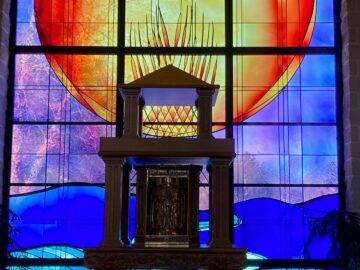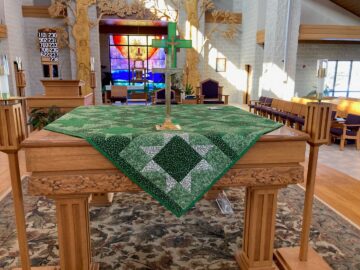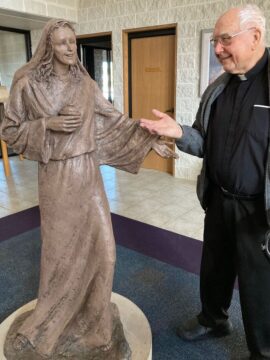Franciscan Friar Fr. Paul Gallagher reflects on the Fifth Sunday of Ordinary Time. The last line of the gospel states that our good works are to be done so that others first of all see our good works, and second, are led by them to praise God. Do you find these words a comfort, a challenge, an encouragement, or something entirely different?
The content is edited by Franciscan Sister of Christian Charity Sister Anne Marie Lom and Joe Thiel. The excerpts from the Sunday readings are prepared by Joe Thiel. To read or download the complete pdf with excerpts for your prayer, please click here Franciscan Gospel Reflection February 5 2023 . Excerpts are from the Lectionary for Mass for Use in the Dioceses of the United States of America, second typical edition © 2001, 1998, 1997, 1986, 1970 Confraternity of Christian Doctrine, Inc., Washington, DC. Used with permission. All rights reserved. No portion of this text may be reproduced by any means without permission in writing from the copyright owner.
Photos: St. Mary Magdalene Catholic Community, Waupaca, Wisconsin, witnessing the Good News. Their mission is to strive through word and action to welcome, to pray, to teach, to share, to heal – reflecting Christ to the total community. Pastor is Father Xavier Arockiasamy Santiago. Pastoral and Liturgical Minister is Bob Lewinski. We visited recently when Father Placid Stroik OFM was substituting for Father Xavier.
Matthew 5:13-16 
Jesus said to his disciples: “You are the salt of the earth. But if salt loses its taste, with what can it be seasoned? It is no longer good for anything but to be thrown out and trampled underfoot.
You are the light of the world. A city set on a mountain cannot be hidden. Nor do they light a lamp and then put it under a bushel basket; it is set on a lampstand, where it gives light to all in the house. Just so, your light must shine before others, that they may see your good deeds and glorify your heavenly Father.
Background:
Matthew often describes Jesus’ teaching to the crowds and to the disciples. After his own baptism, Jesus moved to Capernaum where he began to preach. After calling the first disciples, Jesus is again described by Matthew as “proclaiming the gospel of the kingdom.” (Matt 4:23) In the beginning of the fifth chapter, the disciples approached Jesus and he began to teach them. The first instruction Jesus gave them was the beatitudes. Jesus concluded the beatitudes by telling the disciples that they should consider themselves blessed “when they insult you and persecute you and utter every kind of evil against you falsely because of me.” (Matt 5:11) The gospel text for this week follows with more statements about those who have chosen to become his followers. Jesus draws on salt and light, two common household items, as he asks them to see themselves anew.
Salt was not only used as a seasoning, but it was and is now essential for sustaining life. It was an important preservative, a bleaching agent, used in purifying food, and a catalyst in the community oven. Because of the scarcity of wood, camel or donkey dung were mixed with salt, shaped into patties and dried. The dried patties were then placed on slabs of unrefined salt and used as fuel in ovens. The salt acted as a catalyst in burning the dung. Eventually the salt was absorbed and all that remained was a block of minerals. The blocks were placed in mud roads and paths, especially during the rainy season. Matthew uses both functions of the mineral block—the oven and the foot path—when he says to the disciples ‘you are salt for the “earth-ovens.” The word used carries both meanings, “earth” and “clay oven.”
Salt was an important seasoning. Because salt was such an essential part of daily life, it was natural that it would be incorporated into people’s religious life also. Leviticus records that each cereal offering must be seasoned with salt. “Every cereal offering that you present to the Lord shall be seasoned with salt. Do not let the salt of the covenant of your God be lacking from your cereal offering. On every offering you shall offer salt.” (Lev 2:13)
The scriptures also indicate that salt became associated with the gift of wisdom. “Let your speech always be gracious, seasoned with salt, so that you know how you should respond to each one.” (Col 4:5) Jesus used this rich symbol to instruct his disciples on how they were to be of service not to themselves, but to others.
The other rich symbol used in this text is that of light. Light was part of even poor and modest one-room homes that usually only had one small window. A single light was placed on a lampstand that provided light for the house. Without the use of matches, these lights were valued and protected. In a world without artificial illumination in buildings and on streets, light could be seen from a great distance. These lights were a welcome sight to travelers caught in the wilderness and in the darkness.
Here Jesus has taken two common but essential elements of everyday life and used them to instruct his disciples. He tells them that they are the salt of the earth and they are the light of the world. He does not say that “if you do this,” or that “you will be like” the salt of the earth and light of the world. He asks as the rhetorical question of what if salt loses its taste. The disciples all know that salt does not lose its taste, just as the light of a city on a hill can not be hidden. Jesus is teaching them about their new identity as his disciples, an identity that they themselves may not even perceive or understand.
Reflection Questions:
- Has anyone commented about a quality that they have observed in you, that you yourself were not aware of? Do you recall how you responded when you heard the comment?
- What are some of your favorite spices? How would your enjoyment of food change if the only seasoning you knew of was salt?
- What do you think was going through the minds of those early disciples as they heard Jesus say to them that they were the salt of the earth and the light of the world?
- If a person is described as being the salt of the earth, what would you expect them to be like?
- Can you also think of places in the gospel were Jesus seems to be a person who set fires within his community?
- The last line of the gospel states that our good works are to be done so that others first of all see our good works, and second, are led by them to praise God. Do you find these words a comfort, a challenge, an encouragement, or something entirely different?
- What would you like to tell Jesus about what you are feeling as you hear this gospel today?




Article Comments:
Fr. Placid Stroik, OFM 02/03/2023 @ 10:24 am
Lord Jesus I am honored to be called salt for others and others feel better about themselves because your light shines through me.
Lord Jesus I am honored that I am able to keep going because I see a light in the window ahead and it is You.